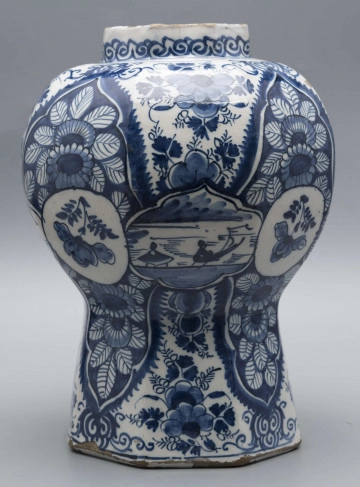
Basket
1800 — 1820
National Museum in Lublin
Part of the collection: English stoneware – Wedgwood
Wedgwood porcelain, from a manufactory located in Staffordshire, is one of the most famous in the world. Founded in 1759 by Josiah Wedgwood, the factory became famous for its ceramics, which date back almost two hundred and fifty years, and the items it produced still delight and find admirers today.
The Wedgwood factory was initially known for its delicate, cream-coloured faience, becoming extremely popular with wealthy clients. In the mid-18th century, it became popular among the great English families to establish large country estates. Elegant residences delighted with their architecture set in extensive gardens and with interiors decorated with grandeur and splendour. Moreover, going from London to the country residences allowed for the organisation of countless social events. The owners of estates, inviting many distinguished guests, competed in many fields, not only in business matters but also in the way they furnished their houses, decorating them with the most fashionable items of high quality, among which the Wedgwood ceramics undoubtedly belonged.
Staffordshire wares appeared in residences all over England, decorating drawing rooms and libraries with magnificent vases and busts of writers and accompanying the household, making the time spent at meals or afternoon tea more pleasant. An example of this idyllic character, produced between 1800 and 1820, is a shallow, oval, slightly recessed ceramic basket with a relief basket weave pattern, finished around the rim with a wreath of oval bunting.
Author / creator
Dimensions
cały obiekt: height: 26 cm, width: 29,5 cm
Object type
dish
Technique
ceramic technique
Material
ceramic
Creation time / dating
Creation / finding place
Owner
The National Museum in Lublin
Identification number
Location / status

Wedgwood
1800 — 1820
National Museum in Lublin

Wedgwood
1820 — 1830
National Museum in Lublin

unknown
1740 — 1750
National Museum in Lublin
DISCOVER this TOPIC
National Museum in Lublin
DISCOVER this PATH
Educational path
0/500

We use cookies to make it easier for you to use our website and for statistical purposes. You can manage cookies by changing the settings of your web browser. More information in the Privacy Policy.
We use cookies to make it easier for you to use our website and for statistical purposes. You can manage cookies by changing the settings of your web browser. More information in the Privacy Policy.
Manage cookies:
This type of cookies is necessary for the website to function. You can change your browser settings to block them, but then the website will not work properly.
WYMAGANE
They are used to measure user engagement and generate statistics about the website to better understand how it is used. If you block this type of cookies, we will not be able to collect information about the use of the website and we will not be able to monitor its performance.